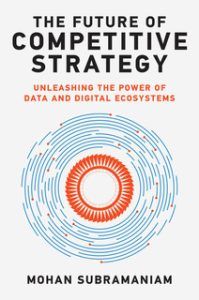
Industries play a monumental role in the business world. They bestow firms with an identity. They help them find common buyers and suppliers, as well as identify key rivals. They provide a rich context for firms to organize their value chains and to position their products/services in their markets. In addition, select traits of industries, such as fixed costs, propensity to develop economies of scale, or number of competitors, allow firms to amplify the value of their products/services and their market positions to drive competitive advantage. Not surprisingly, for several decades now, firms have used industries as their primary anchors to shape competitive strategy.
Yet, times are changing. Digital platforms like Facebook, Amazon and Google have given us irrefutable evidence that data — not just products, are formidable drivers of revenue. And digital ecosystems — not industries, amplify the value of data. Digital ecosystems are networks of data generators and recipients. We all are familiar with how Uber and Airbnb harness their networks of drivers/riders or renter/homeowners to amplify the value of their data. And by harnessing the power of their data and digital ecosystems, Facebook, Google, and their ilk have even displaced mighty industry-anchored legacy giants such as Boeing and Exxon Mobil as the most valuable companies in the world.
Legacy firms however are not digital platforms. They operate through value chains. But modern technologies like sensors, IoT and artificial intelligence (AI) allow them also to use data in new ways, similar to those adopted by the digital platforms. These new approaches can empower them too with expanded value generating scope. This requires framing competitive strategy in digital ecosystems, not just industries.
Sleep Number, a legacy mattress producing-and-selling company, is now generating data on users’ heartrates, breathing, and body movements to track the quality of their sleep. By harnessing this data in newly constructed digital ecosystems, they have generated new capabilities to identify health issues such as sleep apnea and restless leg syndrome. These capabilities are opening opportunities to generate fresh revenue streams and expand their business scope. Partnering with the Mayo Clinic, Sleep Number is planning on being a wellness provider, not just a mattress provider. A host of legacy firms can avail of such new opportunities — whether they make toothbrushes, asthma inhalers, construction equipment, sell newspapers, or are insurance companies and banks.
All of them can generate new revenue streams from data and drive competitive advantage through their digital ecosystems.
For digital platforms, digital ecosystems are a natural habitat as their business models intrinsically rely on data sharing/receiving networks. Legacy firms however need to conceive of their digital ecosystems differently — in ways relevant to their prevailing business models. In my book, I offer a new framework for digital ecosystems tailored for legacy firms. I see them as a combination of production and consumption ecosystems.
Production ecosystems emerge when value chains turn into data generating and sharing networks. They started with firms using information technologies to improve their value-chain operational efficiencies. Today, production ecosystems enriched by sensors, IoT, and AI firms can not only substantially enhance operational efficiencies but also generate new revenue streams. Caterpillar uses their production ecosystems to track product use in construction sites, anticipate component failures, and offer new predictive maintenance services. Sleep Number’s capabilities to predict select sleep-related health conditions and to drive new revenues from them, similarly, come from their production ecosystems. Operations, R&D, product development, marketing, sales, and after-sales service units — when digitally connected to receive, analyze, generate, share, and react to sensor and IoT data — can harness new value from data. The richer these production ecosystems, the greater their power to generate a data-driven advantage.
Consumption ecosystems go beyond a firm’s internal value chain infrastructure. They are external networks of connected third-party assets and entities that complement a product’s use and expand the ways a firm’s products are consumed. Smart mattresses can shut off lights, music, or televisions just when a user falls asleep. Smart toothbrushes connected to a network of dentists that track users’ dental health to predict and prevent cavities. Smart inhalers (used to manage asthma) can track environmental allergens and warn a user before they trigger an asthmatic attack. To operate in consumption ecosystems, firms must extend their value chains into digital platforms and facilitate exchanges among product users and these third-party entities, just as how Uber does with drivers and riders. The contours of these digital ecosystems do not follow industry boundaries.
Furthermore, consumption ecosystems allow firms to envision their business scope beyond what is defined by their traditional value chains or industries. Firms who perceive new ways by which smart products and customers can be connected to a growing set of complementary third-party entities, will thrive in the modern digital world. Conversely, firms that remain stuck in prevailing industry mindsets will face competitive peril.
Digital ecosystems, whether production or consumption ecosystems, provide new avenues to harness the power of data. They are necessary for firms to move from a “products/services only” world to a “data-driven also” world. This does not mean that traditional strengths in products, value chains, and industries are not relevant in the digital world. They remain important foundations and offer legacy firms a useful springboard to leapfrog into the digital world. Rich production ecosystems stem from robust value chains. Vibrant consumption ecosystems emerge from strong networks of connected products. But this new competitive landscape requires legacy firms to expand their competitive mindsets from industries to digital ecosystems.

Mohan Subramaniam is a Professor of Strategy and Digital Transformation at the International Management Development (IMD) Business School in Lausanne, Switzerland. He is the author of The Future of Competitive Strategy: Unleashing the Power of Data and Digital Ecosystems (MIT Press, 2022).

Thinkers50 Limited
The Studio
Highfield Lane
Wargrave RG10 8PZ
United Kingdom

Thinkers50 Limited
The Studio
Highfield Lane
Wargrave RG10 8PZ
United Kingdom

Thinkers50 Limited
The Studio
Highfield Lane
Wargrave RG10 8PZ
United Kingdom
| Cookie | Duration | Description |
|---|---|---|
| LANG | 9 hours | Linkedin set this cookie to set user's preferred language. |
| nsid | session | This cookie is set by the provider PayPal to enable the PayPal payment service in the website. |
| sp_landing | 1 day | The sp_landing is set by Spotify to implement audio content from Spotify on the website and also registers information on user interaction related to the audio content. |
| sp_t | 1 year | The sp_t cookie is set by Spotify to implement audio content from Spotify on the website and also registers information on user interaction related to the audio content. |
| tsrce | 3 days | PayPal sets this cookie to enable the PayPal payment service in the website. |
| x-pp-s | session | PayPal sets this cookie to process payments on the site. |
| __cf_bm | 30 minutes | This cookie, set by Cloudflare, is used to support Cloudflare Bot Management. |
| Cookie | Duration | Description |
|---|---|---|
| l7_az | 30 minutes | This cookie is necessary for the PayPal login-function on the website. |
| Cookie | Duration | Description |
|---|---|---|
| CONSENT | 2 years | YouTube sets this cookie via embedded youtube-videos and registers anonymous statistical data. |
| _ga | 2 years | The _ga cookie, installed by Google Analytics, calculates visitor, session and campaign data and also keeps track of site usage for the site's analytics report. The cookie stores information anonymously and assigns a randomly generated number to recognize unique visitors. |
| _gat_gtag_UA_10408481_1 | 1 minute | Set by Google to distinguish users. |
| _ga_ZP8HQ8RZXS | 2 years | This cookie is installed by Google Analytics. |
| _gid | 1 day | Installed by Google Analytics, _gid cookie stores information on how visitors use a website, while also creating an analytics report of the website's performance. Some of the data that are collected include the number of visitors, their source, and the pages they visit anonymously. |
| Cookie | Duration | Description |
|---|---|---|
| NID | 6 months | NID cookie, set by Google, is used for advertising purposes; to limit the number of times the user sees an ad, to mute unwanted ads, and to measure the effectiveness of ads. |
| test_cookie | 15 minutes | The test_cookie is set by doubleclick.net and is used to determine if the user's browser supports cookies. |
| VISITOR_INFO1_LIVE | 5 months 27 days | A cookie set by YouTube to measure bandwidth that determines whether the user gets the new or old player interface. |
| YSC | session | YSC cookie is set by Youtube and is used to track the views of embedded videos on Youtube pages. |
| yt-remote-connected-devices | never | YouTube sets this cookie to store the video preferences of the user using embedded YouTube video. |
| yt-remote-device-id | never | YouTube sets this cookie to store the video preferences of the user using embedded YouTube video. |
| yt.innertube::nextId | never | This cookie, set by YouTube, registers a unique ID to store data on what videos from YouTube the user has seen. |
| yt.innertube::requests | never | This cookie, set by YouTube, registers a unique ID to store data on what videos from YouTube the user has seen. |
| Cookie | Duration | Description |
|---|---|---|
| DEVICE_INFO | 5 months 27 days | No description |
| loglevel | never | No description available. |
| m | 2 years | No description available. |
Thinkers50 Limited has updated its Privacy Policy on 28 March 2024 with several amendments and additions to the previous version, to fully incorporate to the text information required by current applicable date protection regulation. Processing of the personal data of Thinkers50’s customers, potential customers and other stakeholders has not been changed essentially, but the texts have been clarified and amended to give more detailed information of the processing activities.